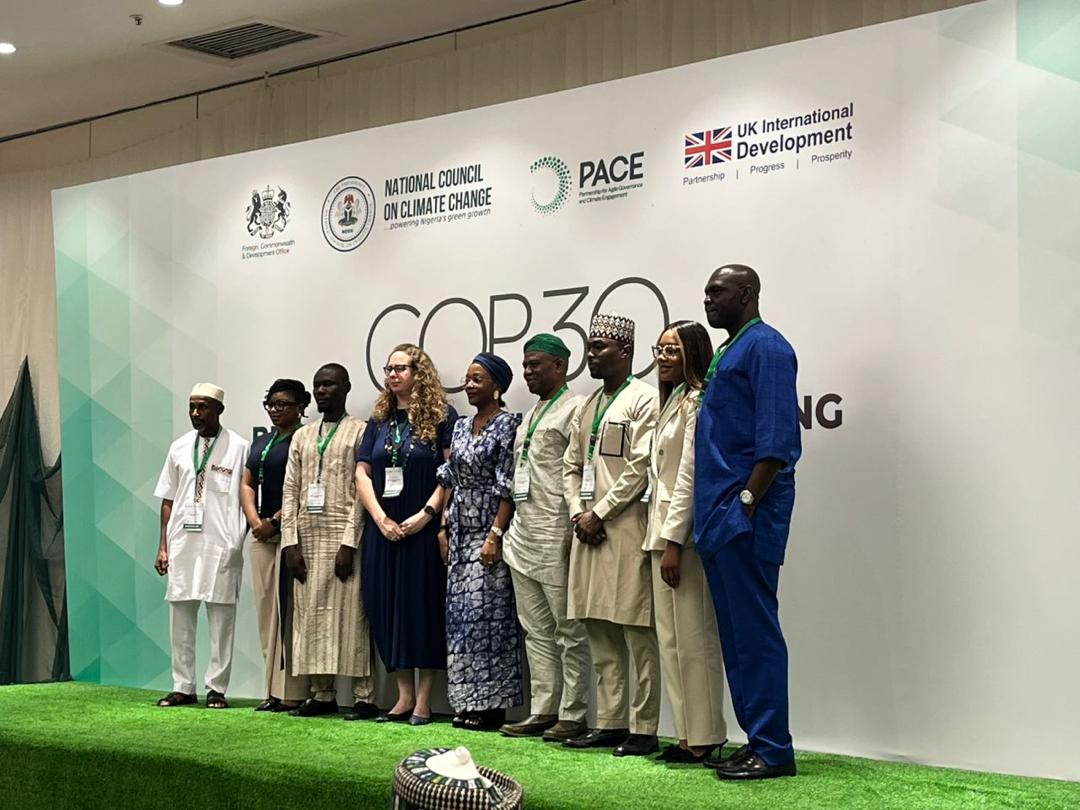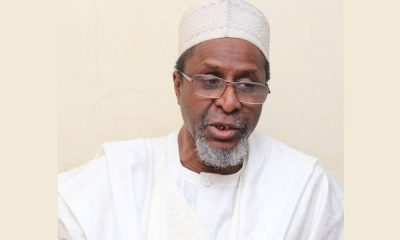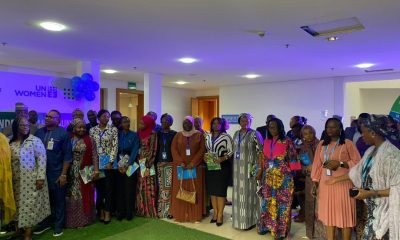NATIONAL NEWS
NCCC Unveils High-Level PreCOP Briefing To Sharpen Climate Negotiation Power

The National Council on Climate Change (NCCC), in collaboration with the British Embassy and PACE, has organized a two-day PreCOP30 Briefing and Negotiators’ Training in Abuja. This event aims to equip Nigeria’s delegates with the strategies, skills, and unity necessary to advocate for a just, well-financed, and inclusive climate transition on the global stage.
With less than two weeks to the landmark COP30 in Belém, Brazil, the event comes at a crucial time, the Director General, National Council on Climate Change (NCCC), Mrs. Omotenioye Majekodunmi
In her keynote address, she reminded the audience that COP30 is not about bureaucracy or endless talks, it is a turning point for taking real action on climate promises.
She said, “This meeting is not another procedural call. As we all have been hearing, this is an implementation call. And I have seen it.”
She highlighted how Nigeria’s participation in global climate forums directly connects to the nation’s economic and environmental future, ensuring that negotiations bring tangible benefits home.
She noted, “For Nigeria, COP30 presents an opportunity to translate these global decisions into tangible national benefits to secure finance, technology, and partnerships that support our NDC 3.0, our LT-LEDS, and all the other objectives under the Partnership Act of 2021. This two-day session is part of our continuing effort to professionalize Nigeria’s negotiating role, to ensure every delegate speaks from an informed, united, and strategic position.”
Majekodunmi outlined Nigeria’s central message for COP30, advocating for a fair, inclusive, and well-financed path toward low-carbon growth and resilience.
The DG emphasized, “Our vision for COP30 is clear to advance a just, inclusive, and well-financed transition that strengthens resilience, drives low-carbon development, and safeguards the prosperity of Nigerians. Based on extensive consultations and analysis, the key priorities Nigerians will champion at COP30 include climate finance and implementation readiness, mitigation and just transition, adaptation and resilience, transparency, inclusion, and partnerships.”
She framed Nigeria’s stance not as vulnerable but as determined, grounded in purpose, partnerships, and optimism.
Mrs. Majekodunmi declared, “We do not negotiate from a place of vulnerability, but from the position of purpose, partnership and possibility.”
Majekodunmi challenged every negotiator to ensure that agreements at global meetings translate into real outcomes for ordinary Nigerians.
She said, “Every word negotiated, every comma inserted, every coalition built must translate into climate action at will into cleaner air, sustainable jobs, resilient communities, secure livelihoods, and the backbone of environmental peace. Let this briefing and training not only sharpen our negotiation skills, but also reaffirm our national unity of purpose.”
Closing her remarks, she reminded participants that tackling climate change is a national duty across all sectors.
The Director-General concluded, “Climate action is not the work of one ministry or one agency or one council. It’s Nigeria’s collective development strategy.”
Majekodunmi’s address balanced vision and practicality, urging Nigerian negotiators to act boldly, speak with one voice, and ensure that global climate diplomacy delivers measurable progress for Nigerians.
Samantha Harrison of the British Commission emphasized that progress at COP30 depends not only on strong commitments but also on skilled negotiation. She stressed the importance of effective communication and consensus-building in achieving meaningful global climate action.
She said, “The UK understands the crucial role that skilled negotiators play at COP, where the ability to effectively advocate for national interests and build consensus is key to securing meaningful progress on the global climate emergency.”
Harrison highlighted the urgency of COP30, noting that climate impacts are intensifying and trust in international collaboration is being tested.
She said, “It is clear that the need for world-range, highly skilled negotiators has never been more critical. COP30 comes at a crucial moment, as climate impacts intensify and faith in the multilateral system is tested.”
She commended Nigeria for demonstrating leadership and commitment through its updated Nationally Determined Contribution (NDC 3.0).
She said, “We commend Nigeria for submitting its Economy-Wide NDC 3.0, a clear demonstration of leadership and commitment to tackling climate change.”
In her concluding remarks, Harrison called on nations to restore collective resolve and ensure that COP30 delivers real, equitable outcomes.
She highlighted partnership, financial support, and strategic collaboration between the UK and Nigeria to turn ambitious climate commitments into tangible progress.
She said, “COP30 must demonstrate that we can rebuild shared resolve to close the ambition gap and make sure COP delivers for all. The UK is committed to helping Nigeria attract greater flows of climate finance and accelerate the transition to a low-carbon economy.
“The training will help you effectively advocate for Nigeria’s priorities, including access to climate finance, which holds the potential to unlock new funding streams essential for climate resilience and sustainable development.
“As we look ahead, I encourage you to remain steadfast, collaborate closely, and think strategically. Your work over the coming days will help ensure that Nigeria’s voice is heard and that you emerge from COP30 with outcomes that support your national interests and the global climate agenda.”
Samantha Harrison’s goodwill message underscored partnership, preparedness, and action. She applauded Nigeria’s leadership, urged negotiators to strengthen collaboration, and reminded participants that COP30 must turn ambition into tangible global progress.
Saadatu Gambo, representing the NCCC/TBD, opened the session by emphasizing the importance of preparation and skill in climate negotiations.
She said, “I’m thrilled to welcome you all to this negotiator’s training. We have gathered to explore the art of negotiation, share best practices, and develop the skills needed to navigate complex deals and conversations, such as effective communication, building trust, and problem-solving.”
Highlighting the stakes of COP30, Gambo added, “I’m excited to learn from every one of you. I’m confident that by the end of this training, you’ll be equipped with the tools and confidence to tackle even the toughest of negotiations. Let us get started and make the most of the time together.”
The NCCC outlined Nigeria’s key priorities for COP30 in the overview of the agenda, which will take place in Belém, Brazil, running in three phases: the pre-summit on November 6–7, technical negotiations from November 10–15, and the high-level segment from November 16–21, when final decisions will be adopted.
Discussions will focus on implementing the Paris Agreement and advancing outcomes from COP29. Nigeria’s priorities include strengthening its updated Nationally Determined Contribution (NDC 3.1) with new 2035 targets, securing climate finance through the new $1.3 trillion collective goal, and advancing the Global Goal on Adaptation to address Africa’s needs. Negotiations will also cover Article 6 on carbon markets and the Just Energy Transition to ensure fairness, inclusion, and green job creation.
Thematic days will highlight adaptation, human development, economic transformation, biodiversity, and food security. The overall focus of COP30 is on implementation, climate justice, and linking climate action to national development.
The NCCC reaffirmed that Nigeria will participate from a position of collaboration and readiness, determined to turn commitments into measurable climate action that strengthens resilience, drives sustainable growth, and promotes equity across the nation and the African region
-
CRIME4 years ago
PSC Dismisses DCP Abba Kyari, To Be Prosecuted Over Alleged $1.1m Fraud
-
FEATURED4 years ago
2022 Will Brighten Possibility Of Osinbajo Presidency, Says TPP
-
FEATURED2 years ago
Buhari’s Ministers, CEOs Should Be Held Accountable Along With Emefiele, Says Timi Frank
-
BUSINESS & ECONOMY2 years ago
Oyedemi Reigns As 2023’s Real Estate Humanitarian Of The Year
-
SPORTS2 years ago
BREAKING: Jürgen Klopp Quits Liverpool As Manager At End Of Season
-
SPORTS2 years ago
Could Liverpool Afford Kylian Mbappe For €200 million? Wages, Transfer Fee
-
ENTERTAINMENT2 years ago
Veteran Nigerian Musician, Basil Akalonu Dies At 72
-
FEATURED2 years ago
Tribunal Judgement: Peter Obi Warns Of Vanishing Electoral Jurisprudence, Heads To Supreme Court
-
BUSINESS & ECONOMY2 years ago
Oyedemi Bags ‘Next Bulls Award’ As BusinessDay Celebrates Top 25 CEOs/ Business Leaders
-
FEATURED4 years ago
2023 Presidency: South East PDP Aspirants Unite, Demand Party Ticket For Zone



































